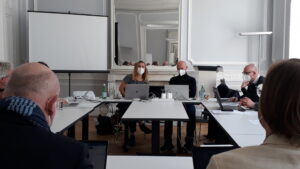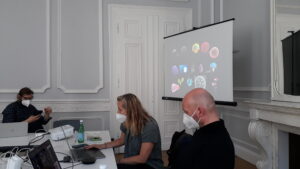Technologically enlightened: Interdisciplinary research in robotics or the privilege of being messy

Today’s c:o/re workshop on Interdisciplinary Research in Robotics and AI, organized by Joffrey Becker, insightfully showcased the mutual relevance between scientific and market research, particularly in the concern of design. It convincingly posited that materiality and physical properties are intrinsic to learning. The talks by Samuel Bianchini, Hugo Scurto and Elena Tosi Brandi showed that learning is a matter of designing. We do not make stuff out of nothing. Elena Tosi Brandi explained that “when you design behaviors, you have to put an object in an environment, a context.” Humans appear to notice this by interacting with robots. For example, machine learning processes offer opportunities for humans to reflect on their own learning. Animated (digital) objects acting independently from humans and thus, arguably, having agency, in so many words, make us wonder. Observing relations between software, bodies and non-organic matter places humans in a new position to understand how materiality is intrinsic to knowledge. Director of c:o/re, Stefan Böschen noted that experimental research on robotics is often open-ended, aiming to stimulate innovation in a “what may be” interrogation. To this, Hugo Scurto shared that for him “it is a privilege to be able to do research in a messy way”

The consideration of the epistemic qualities of material properties urges the reconsideration of Western modern philosophy, which we shall dive into in tomorrow’s workshop, Enlightenment Now, hosted by Steve Fuller and Frederik Stjernfelt. As Steve Fuller already remarked, listening to Elena Tosi Brandi’s work on design, it is possible “that machines and humans might both improve their autonomy through increased interaction. But this will depend on both machines and humans being able to learn in a sufficiently ‘free’ way, regardless of what that means.” If Hume woke up Kant from the dogmatic slumber, it seems that robots can wake us up some more.


